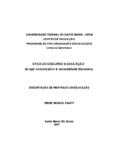| dc.creator | Knapp, Irene Monica | |
| dc.date.accessioned | 2007-08-23 | |
| dc.date.available | 2007-08-23 | |
| dc.date.issued | 2007-03-13 | |
| dc.identifier.citation | KNAPP, Irene Monica. Ethics of the discourse and education: from communicative act to discursive rationality. 2007. 114 f. Dissertação (Mestrado em Educação) - Universidade Federal de Santa Maria, Santa Maria, 2007. | por |
| dc.identifier.uri | http://repositorio.ufsm.br/handle/1/7267 | |
| dc.description.abstract | The dissertation to intend to broach pertinent points to the ethics and its relation with the education in the actual scene, focusing the problematic of the rationalization of the world. This phenomenon is legitimated for the technological potential of science and for the human attitudes implied in this process. The reduction of the rationality to the technician-instrumental aspects restricts the argument space about problematic
questions concerning a common world that requires the agreement with the other. In the practical-moral field, the monological attitude restricted the ethical questions to an
individualism way of life, limiting the reflexive potential of the subject about his act. And this reflexive potential is only possible of being carried through the practical discourse. The consequences of subjectivist ethics had reached global scale and argue the parcel of responsibility in the face of current problems, which demand the use of a communicative rationality in a rationally motivated effort. Habermas considers the reasons resource on behalf of communicative rationality, in perspective of that it is possible to rescue validity pretensions involving not only the subject world, but also the social and subject world present in the vital context. The method of the discourse, presented for the philosopher in his Ethics of the Discourse, asserts that the participants has to leave their self-centered position for the agreement with the
other, assuming the responsibility about their utterances. In the education, the theoretical subsidies present in the Ethics of the Discourse to be able to contribute to act of the different rationalities for the benefit of the knowledge construction | eng |
| dc.format | application/pdf | por |
| dc.language | por | por |
| dc.publisher | Universidade Federal de Santa Maria | por |
| dc.rights | Acesso Aberto | por |
| dc.subject | Ética do discurso | por |
| dc.subject | Racionalidade | por |
| dc.subject | Ética | por |
| dc.subject | Moral | por |
| dc.subject | Ethics of the discourse | eng |
| dc.subject | Rationality | eng |
| dc.subject | Ethical | eng |
| dc.subject | Moral | eng |
| dc.title | Ética do discurso e educação: do agir comunicativo à racionalidade discursiva | por |
| dc.title.alternative | Ethics of the discourse and education: from communicative act to discursive rationality | eng |
| dc.type | Dissertação | por |
| dc.description.resumo | A dissertação tem a intenção de abordar pontos pertinentes à ética e sua relação com a educação no cenário hodierno, focalizando a problemática referente ao fenômeno da racionalização do mundo legitimado pelo potencial tecnológico da ciência e a possibilidade de uma argumentação discursiva crítica frente às atitudes humanas implicadas neste processo. A redução da racionalidade ao aspecto técnicoinstrumental
restringe o espaço de discussão sobre questões problemáticas que dizem respeito a um mundo comum a todos e requer o entendimento com o outro. No campo prático-moral, a atitude monológica no enfrentamento com o mundo enquadrou as questões éticas a um modo de vida individual, limitando o potencial reflexivo do sujeito sobre seu agir, uma vez que este só é possível de ser realizado na relação intersubjetiva via discurso prático. As conseqüências de uma ética
subjetivista alcançaram escala global e questionam a parcela de responsabilidade solidária diante dos problemas atuais os quais demandam o uso de uma racionalidade comunicativa voltada ao reconhecimento da alteridade num esforço
racionalmente motivado. Habermas propõe o recurso argumentativo em favor de uma racionalidade comunicativa, na perspectiva de que seja possível resgatar pretensões de validez envolvendo não apenas um mundo objetivo, mas também o mundo social e subjetivo presentes no contexto vital. O método do discurso, apresentado pelo filósofo em sua Ética do Discurso, parte de princípios nos quais os
participantes têm de sair de sua posição egocêntrica para o entendimento com o outro, assumindo a responsabilidade sobre seus proferimentos. Na educação, os subsídios teóricos presentes na Ética do Discurso levantam expectativas de
contribuir para o agir das diferentes racionalidades presentes na construção do conhecimento | por |
| dc.contributor.advisor1 | Trevisan, Amarildo Luiz | |
| dc.contributor.advisor1Lattes | http://lattes.cnpq.br/2534601801498544 | por |
| dc.contributor.referee1 | Hermann, Nadja Mara Amilibia | |
| dc.contributor.referee1Lattes | http://lattes.cnpq.br/6880413202306939 | por |
| dc.contributor.referee2 | Pereira, Sueli Menezes | |
| dc.contributor.referee2Lattes | http://lattes.cnpq.br/3883536502592508 | por |
| dc.contributor.referee3 | Rossatto, Noeli Dutra | |
| dc.contributor.referee3Lattes | http://lattes.cnpq.br/2947312243186882 | por |
| dc.creator.Lattes | http://lattes.cnpq.br/9107893950721812 | por |
| dc.publisher.country | BR | por |
| dc.publisher.department | Educação | por |
| dc.publisher.initials | UFSM | por |
| dc.publisher.program | Programa de Pós-Graduação em Educação | por |
| dc.subject.cnpq | CNPQ::CIENCIAS HUMANAS::EDUCACAO | por |


